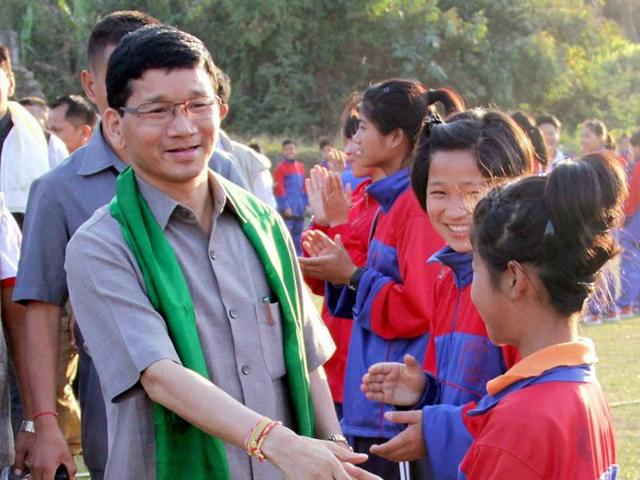Arunachal changeover shows BJP’s new ambitions in the Northeast
The BJP seems to be controversially using Article 356, as Congress once did, to remove unfriendly governments. This can be linked to its new hunger
In the political arithmetic of India, Arunachal Pradesh is a small, remote state that sends only two members to the Lok Sabha and one to the Rajya Sabha, with a population of less than 2 million. But events in the state bordering China this year have raised the spectre of constitutional coupa, and questions on the political morality of a governor’s rule in a controversial change of government in which the party ruling over the Centre is the gainer.

It is perhaps ironic that it was on the Republic Day this year that the state was brought under President’s rule under Article 356 of the Constitution on the Union cabinet’s recommendation on the ground that there was a constitutional breakdown in the state. Clearly, President Pranab Mukherjee, despite being an old Congressman, acted without favour in accepting the recommendation that led to the end of Congress rule in the state.
The manner in which the Congress lost ground from 42 seats in the 60-member assembly to a minority status in which the bulk of its rebels moved to join the (PPA), which originally had 5 MLAs aligned with Congress, is a matter that certainly is of concern in democratic governance. With 21 Congress rebels joining 11 BJP and 2 MLAs led by rebel Kalikho Pul, chief minister Nabam Tuki lost support, but the way the events unfolded were awkward. The legislative assembly was locked down and the rebels showed their strength at a community hall and later at a hotel, with the incumbent chief minister and his loyalists staying away. The Guwahati high court upheld the validity of this session because the Constitution clearly says the governor can choose the time and venue of a session as long as there is no more than a gap of six months between sessions.
However, the political controversy is about the invocation by the governor of Article 356 of the Constitution that requires a constitutional breakdown to bring in central rule. Governor Jyoti Prasad Rajkhowa sent a message to the President that the law and order situation had broken down and even the governor’s house was unsafe. Tuki’s claim that not even a mosquito died (ek machar bhi nahi mara) did not go far.
On February 19, Pul was sworn in as the state’s new chief minister with support from 31 MLAs --- two days after the Centre revoked President’s rule, one day after the Supreme Court removed its own interim order to maintain status-quo on Tuki’s plea. Since the Congress has expelled the rebels, as many as 30 of its rebels en-masse joined the PPA on March 3, including the new chief minister! Overnight, a tiny regional group became the state assembly largest party.
The Congress and its allies as well as other non-BJP parties have understandably alleged that the central government had misused the Constitution in order to dismiss an unfriendly state government.
However, it was the Congress that in the heyday of its rule in the 1980s that used Article 356 controversially to dismiss opposition-led state governments. The Northeast is its stronghold and the BJP’s newfound eagerness to install a new government can be linked to its rising ambitions in the region.
The overnight emergence of a regional party in the Northeast will be a supporting argument during the looming state legislative assembly elections for other regional parties and the BJP that the rebels in AP broke away from the Congress due to over-interference from the party high command in Delhi over regional matters. On the other hand, Congress can counter this by saying BJP-ruled states are controlled from Nagpur, the headquarters of the Rashtriya Swayamsevak Sangh.
Indications are that the BJP expects Arunachal to trigger a domino effect that will help it establish itself in the Northeast and hopefully spill over into West Bengal via Assam. Both Assam and West Bengal are due to hold assembly elections.
While the BJP may use this to fan its dream of a “Congress-mukt Bharat” (Congress-free India) and also gain vital seats in the Rajya Sabha, its conduct shows no major political party in India is free of political vices.
Article 356 has been used numerous times by successive central governments to usurp state governments although its use has gradually declined over the years.
There is also greater controversy involved whenever Article 356 is invoked in situations where the ruling party of the state government differs from the central government. As Dr BR Ambedkar observed with reference to the Constitution, it is not the letter but the intent of those that implement it matters more.
The latest saga may make some ponder over abuse of constitutional provisions. In the context of Prime Minister Narendra Modi speaking about the need for cooperative federalism, the Arunachal developments has led to accusations of coercive federalism.
The key question is over the validity of the Centre in deciding the fate of a state government in a federal system. The issues related to Article 356 should be between the state legislature, governor and the President without the involvement of the Union Cabinet. There may be a case to repeal Article 356’s section (1) B that allows the Centre to directly rule a state. If state governments are reduced to being puppets of the Centre, it clearly goes against the principle of federalism.
(The author is an economist & writer, currently based in Singapore, whose areas of interest include geopolitics and South Asia)



